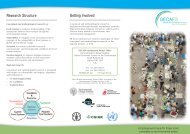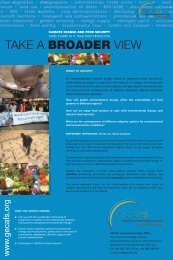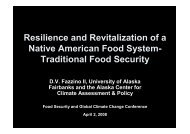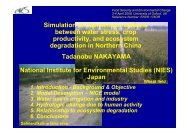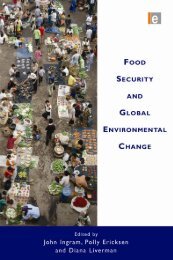From Food Production to Food Security - Global Environmental ...
From Food Production to Food Security - Global Environmental ...
From Food Production to Food Security - Global Environmental ...
- No tags were found...
You also want an ePaper? Increase the reach of your titles
YUMPU automatically turns print PDFs into web optimized ePapers that Google loves.
Paper 5: Engaging Stakeholders at the Regional LevelAdapted from:Ingram, JSI, J Andersson, G Bammer, M Brown, K Giller, T Henrichs, J Holmes, JW Jones, RSchilpzand and J Young. 2010. Engaging stakeholders at the regional level. pp 169-197 In: <strong>Food</strong> <strong>Security</strong> and <strong>Global</strong> <strong>Environmental</strong> Change. JSI Ingram, PJ Ericksenand DM Liverman (Eds). Earthscan, London.Introduction<strong>Food</strong> security in the face of global environmental change (GEC) is one of the most complexissues facing the research community at large. Although most policy-makers, scientists andfunding agencies recognize the need for additional knowledge about how the various foodsystem activities interact and how these interactions affect food security, research that iscapable of adequately addressing the problem is hard <strong>to</strong> find. This is because not only arethere large uncertainties in many aspects of the debate, but the debate involves a bewilderingrange of interested parties, or ‘stakeholders’. A further complication is that food systemsinvolve critical interactions at a number of levels on a range of scales (e.g. spatial, temporal,jurisdictional, institutional, management) (Cash et al., 2006), each of which has its own groupor groups of stakeholders. Research on the interactions between GEC and food securitytherefore has <strong>to</strong> recognize, and engage with, a wide range of stakeholders. This is in contrast<strong>to</strong> research on crop improvement, for instance, where the range of stakeholders is muchnarrower, and may remain predominantly within the research community itself. Whileconsiderable effort has been spent in improving understanding of food system-GECinteractions at the local or household level, research at the regional (sub-continental) level isfar less well developed, but offers important insights in<strong>to</strong> food system adaptation strategiesand policies. This paper therefore addresses stakeholder engagement at regional level.Clearly, aligning the research agenda with stakeholder needs is crucial and this requireseffective dialogue (for example through consultancies, agenda-setting workshops and/orinformal processes). Equally important however is the uptake of research results by theintended beneficiaries that leads on <strong>to</strong> the real value of the research. This similarly dependson continued interactions between researchers and other stakeholders. However, asstakeholder involvement complicates the research process and increases costs for allconcerned, it is it important <strong>to</strong> understand its importance and the value it can bringthroughout a given project.As Kristjanson et al. (2009) summarize, it is important <strong>to</strong> see stakeholder engagement as anintegral aspect of both the conceptualization and the life of the project. They stress the valueof articulating the outcomes sought by the different stakeholders at the project outset <strong>to</strong> help64



